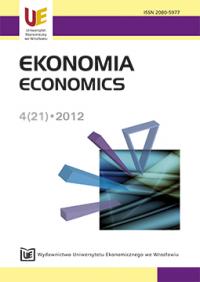Rodzaje ryzyka w działalności wiodących przedsiębiorstw piłkarskich w Europie
Type of risk in activity of leading soccer enterprises in Europe
Author(s): Artur GrabowskiSubject(s): Economy
Published by: Wydawnictwo Uniwersytetu Ekonomicznego we Wrocławiu
Keywords: competition; uncertainty; risk; soccer; company
Summary/Abstract: This paper describes the overall functioning of modern soccer enterprises (FC Bayern, Juventus Turin, Manchester United, Olympique Lyon, Real Madrid) which have their headquarters in five different European countries and actively participate in sport-economic competition on different markets. Each of them has annual turnover over 100 million euro. The companies function under the uncertainty and risk. This is heightened by additional characteristic factors for this type of activity like uncertainty of outcome in sports competition. The adoption of professional sport activities also automatically runs to the risk, but this is not the only problem that the company must confront. Due to this fact, detailed risks identification was undertaken in European sport enterprises. On this basis a classification was proposed, as well as the causes and area of risk influence on sport enterprises were indicated. Three risk categories were distinguished: industrial (sectors), economic and law, to which different risk types indicated by five analyzed subjects were next assigned. A modern model of professional sport (football particularly) can be concluded in MCMMG formula (Media – Corporations – Merchandising – Markets – Global). The processes of globalization build the opportunities, but they are also closely connected with spreading the risk and uncertainty. The key problem for sport enterprises in their activity is to face risk factors coming from internal business environment (e.g. new staff acquisition: players, coaches), as well as external business environment (e.g. external financing). The economic slowdown in euro zone, as well as UEFA’s rules entered into force, are additional challenge that must be faced by sports enterprises. That is why the basic business tools like controlling and diversification should be used by sports enterprises.
Journal: Ekonomia
- Issue Year: 2012
- Issue No: 21
- Page Range: 108-125
- Page Count: 18
- Language: Polish

